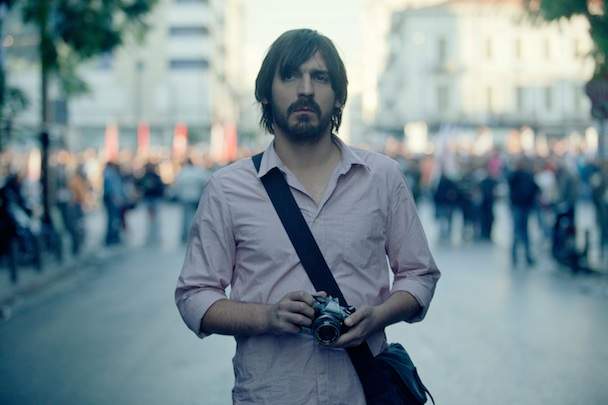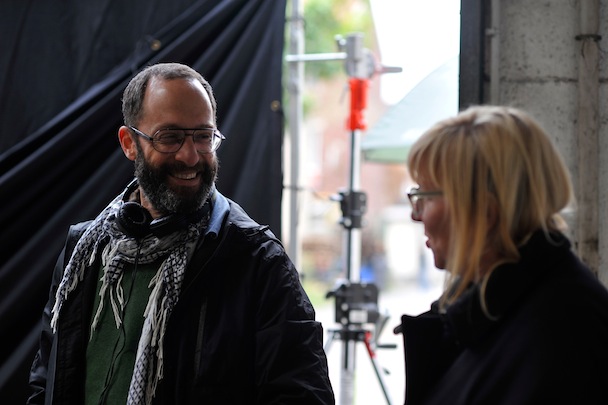Concrete Playground meets Dead Europe director Tony Krawitz
The filmmaker seeks out the ghosts of Europe with his new Christos Tsiolkas adaptation.
When it was published in 2005, Dead Europe, the novel by Christos Tsiolkas, was pronounced both brilliant and completely unfilmable. Tony Krawitz, whose previous films include Jewboy and The Tall Man, took on the challenge and has produced what is at once a deeply beautiful and also one of the most viscerally disturbing films to have emerged from Australia in recent years.
The film follows Isaac, played by Ewen Leslie, who returns to Greece after the death of his father to scatter his ashes. Isaac is gradually drawn deeper into the horror of the diseased underbelly of Europe, all the while pursued by the ghosts of family history. Very kindly, Tony Krawitz sat down one lovely afternoon to have a chat about what is a truly remarkable film with a girl who'd spent the past month writing on the novel.
What was it that made you want to make Dead Europe into a film? Because some said it was unfilmable.
Well, obviously I never felt that. The book, as it is, is unfilmable because it's so dense and beautiful and goes in so many directions. But it felt like the contemporary story had a road movie type of structure. I always knew it would be challenging but I didn't think it would be unfilmable.
Did Tsiolkas have a lot of input or did he let you just run free with it?
He was really free with us. He said, "I saw Jewboy, and I really like it, and I trust you. Go for it," which is freeing and also terrifying. I think he read the last two drafts, and was really encouraging, and then helped us through pre-production and acted almost as a consultant. And he's seen the finished film and he's really happy with it. I think it's because he loves film so much and he understands how different the adaptation needed to be. They're like companion pieces. The way he described it to me is that he kind of got lost in the film and forgot about the book, which is really nice to hear from the author.
The film takes the curse of the book and gives it to the father's side of the family instead of the mother's, which reminded me of the connection between the absent father and the son in Jewboy. Why was it that you decided to place the family story at the centre of the film?
The family curse is central to the book, and that's the main narrative. Folding them together helped to make it more streamlined. What it also did, which I really liked, is it made it more biblical — the sins of the father. The father was someone who said he was a rationalist, who didn't believe in religion, but felt that he was cursed, and Isaac is a rationalist who goes "I don't believe in any of that shit" but finds out that he does.
Would I be right in saying that the protest scenes in the film were the real ones happening in Athens? Was that part of you wanting to try and engage with the reality of Europe, as a sort of documentary?
Yes, that's what I loved about the book. It was such a prescient title. The stuff Christos was seeing seven years ago in the book have come to fruition now in difficult and unexpected ways. With the protests we were looking to update the book and ask, what are the issues now?
The response some readers had to the book was almost one of possession, and I think the film has a similar effect. You feel possessed by it. It makes you feel before you can intellectualise anything. Was that your intention?
Exactly. What we were trying to do as filmmakers was to get the audience past their intellect, to make it visceral. Some people will love that, some people will really hate that and come out going "but that isn't how I think about that, how dare you put that on screen." The reason we were doing that is because that's what happens to Isaac. He's saying, "I am in my intellect, I understand the world, I know what Europe is, I know what suffering is, I know what war is," but he's a sheltered boy from Melbourne.
Did having to deal with such intense themes have an effect on the cast?
Yeah it did. We filmed mostly in sequence, so especially for Ewen, as we got more tired and more run down we were getting to the more intense scenes. I think it was great for him as an actor to be able to go on that journey.
What were your motivations in changing the ending?
It's hard to talk about for people who haven't seen the film yet; I don't want to spoil it. But it changed. It took a lot of conversations to get to that hotel room scene. It does end with more hope than the book, and I like that because the story, for me, is about the forgotten people of Europe. It's about the victims of the past, whether they're Holocaust victims or victims in Yugoslavia or victims today in Syria. Christos is so passionate about human rights and it's like the book was a primal scream about those issues.
The way it seemed to me was that there's this official version of history, which we're constantly curating, but the film is interested in exposing these other histories that we don't acknowledge, but which still exist and still haunt us. And what's so powerful about the film is it's putting up a mirror and saying, "you're implicated in this."
Yes, because we're actually taught that it's other people who do that, and we have no agency or responsibility. And I think that's what's uncomfortable for people, because they want to go watch a film which says "everything's fine", while this is much more unsettling, which people will either really love, or hate.
Read our review of Dead Europe here.
Image 1: Ewen Leslie as Isaac in Dead Europe. Image 2: Tony Krawitz with producer Liz Watts.






